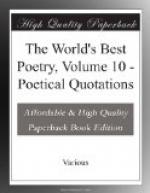“It by no means follows, however, that the incitements of Passion, or the precepts of Duty, or even the lessons of Truth, may not be introduced into a poem, and with advantage; for they may subserve incidentally, in various ways, the general purposes of the work:—but the true artist will always contrive to tone them down in proper subjection to that Beauty which is the atmosphere and the real essence of the poem.”
Lest one should conclude that this is the verdict of an exclusively artistic spirit, bent upon the development of “art for art’s sake” alone, disregardful of the spiritual essence involved, let him read the following passage by Dr. William Hayes Ward, scholar, archaeologist, critic, editor of a great religious journal. Treating of “The Elements of True Poetry,” he lays down this:
“What, then, is poetry? It is the verbal expression of thought under the paramount control of the principle of beauty. The thought must be as beautiful as possible; the expression must be as beautiful as possible. Essential beauty and formal beauty must be wedded, and the union is poetry. Other principles than beauty may govern a literary production. The purpose may be, first, absolute clearness. That will not make poetry. It will make good mathematical demonstration; it may make a good news item; but not poetry. The predominant sentiment may be ethical. That may give us a sermon, but it will not give a poem. A poem is first of all beautiful, beautiful in its content of thought, and beautiful in its expression through words....
“The first and chief element in a poem is beauty of thought, and that beauty may relate to any department, material, mental, or spiritual, in which beauty can reside. Such poetry may describe a misty desert, a flowery mead, a feminine form, a ruddy sky, a rhythmic waterfall, a blue-bird’s flutterings, receding thunder, a violet’s scent, the spicy tang of apples, the thrill of clasped arms and a lover’s kiss. Or it may rise higher, and rest in the relations of things, in similes and metaphors; it may infuse longing and love and passion; it may descant fair reason and meditative musing. Or, in highest flight, beauty may range over the summits of lofty purpose, inspiring patriotism, devotion, sacrifice, till it becomes one with the love of man and the love of God, even as the fading outline of a mountain melts into the blue sky which envelops it....
“Dominant over all beauty is moral beauty. All highest flights of poetry must range in the empyrean.”
Thus, in poetry, all other graces and powers, be they lower or higher, must come under control of the principle of beauty—the pleasing harmony that brings delight. And the almost “infinite variety” of beautiful modes and styles offered in such a gathering of poems as the present finds argument for its worth in the brief extract with which our melange of opinions may well conclude. It is taken from a series of articles in the New York Independent on “A Theory of Poetry,” by the Southern poet, Henry Timrod. Making a protest against the limitation of taste and the poetic vision in certain directions, instead of cultivating a broader range of taste, he says:




